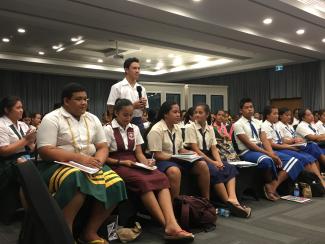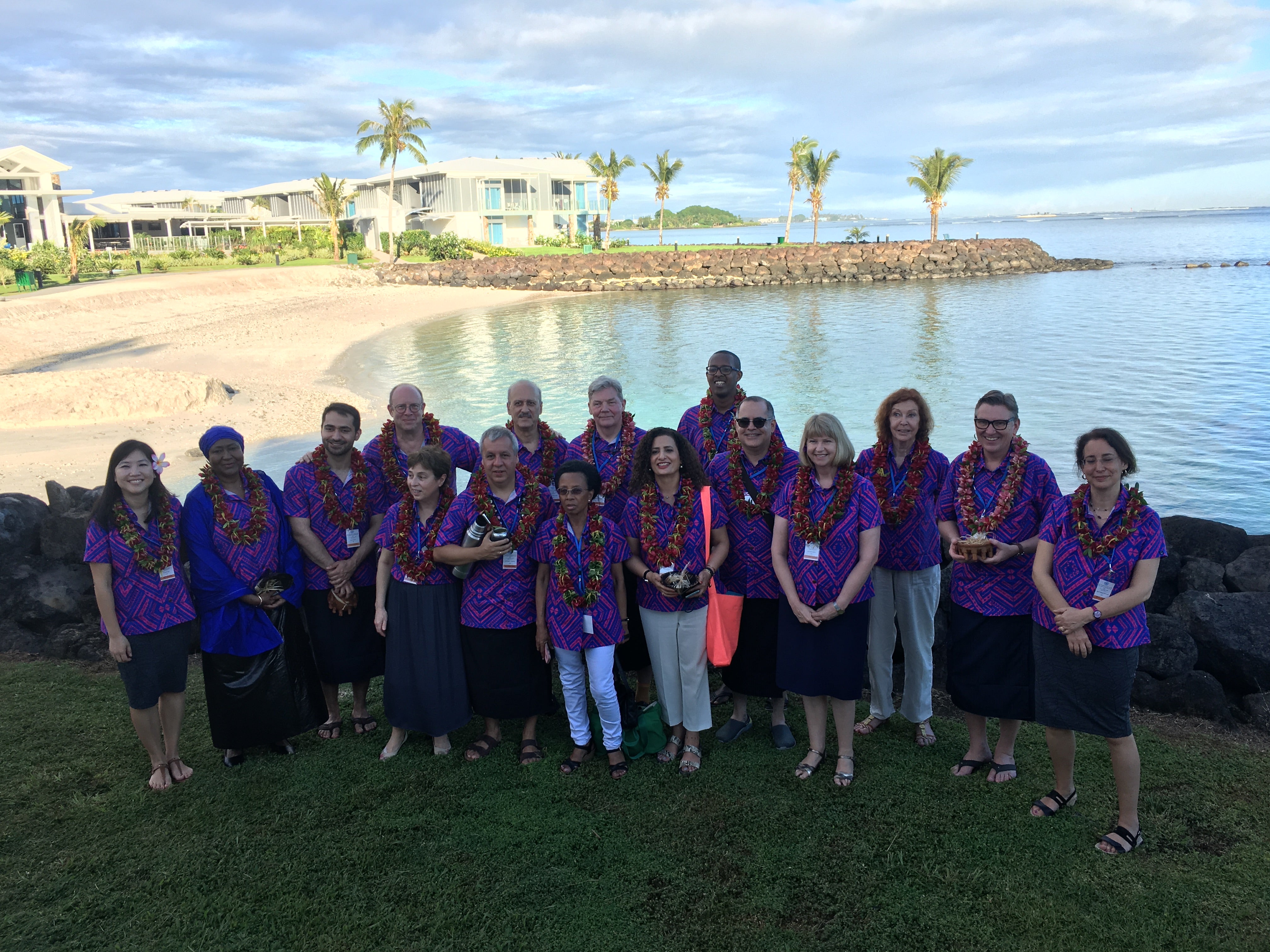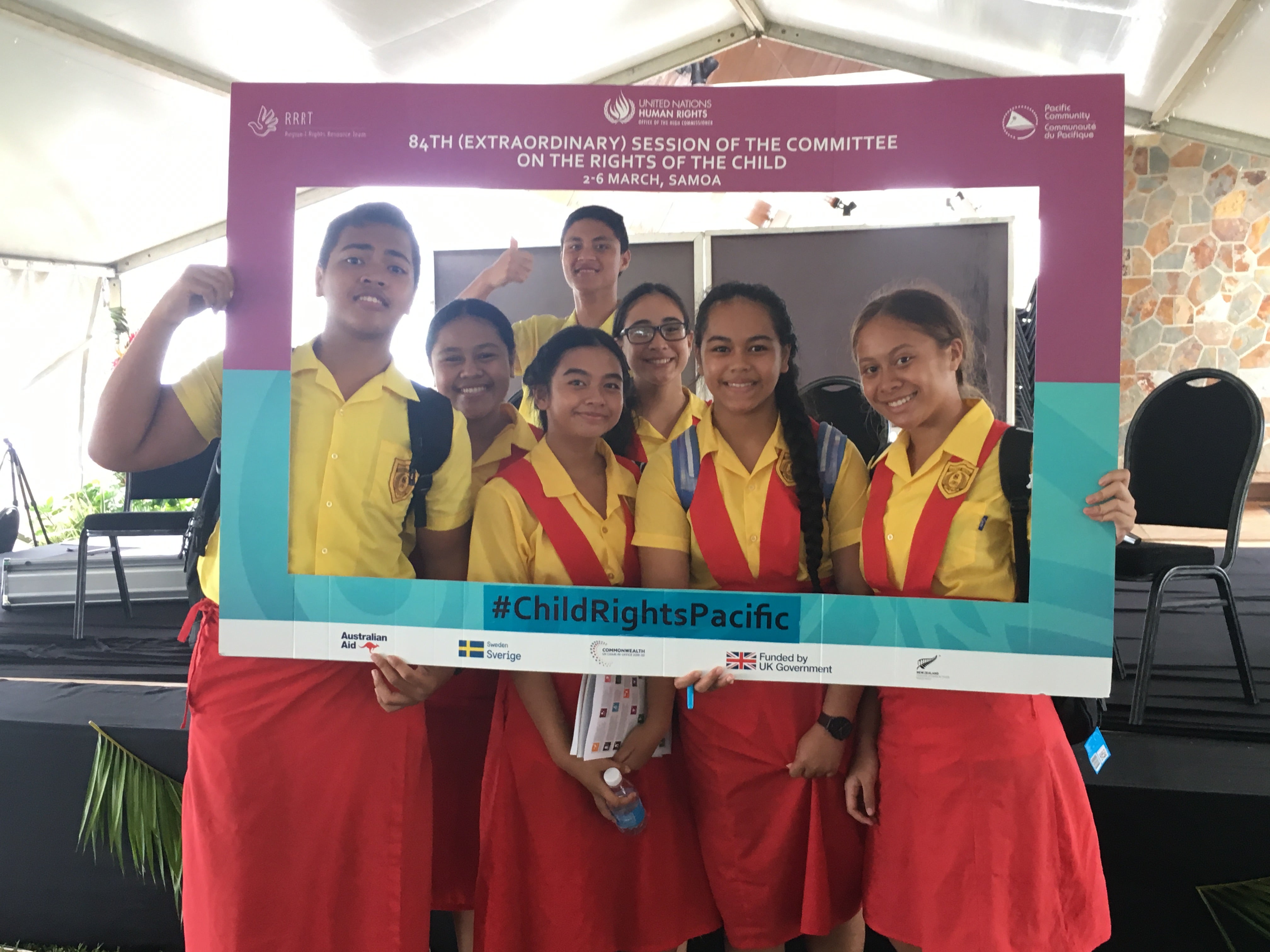
In March 2020, right before the COVID-19 pandemic brought the world to a halt, the United Nations Committee on the Rights of the Child (CRC) at its 84th session crossed a major participatory hurdle by involving children as genuine partners. The Committee, tasked at monitoring the implementation of the international human rights treaty of the Convention on the Rights of the Child, also organized multiple country reviews concerning children’s rights beyond the Palais Wilson, in Oceania. The session, held in Apia, Samoa, was unique in being the first ever regional session hosted outside of Geneva. A record number of Pacific Islands Nations received full reviews: Cook Islands, the Federated States of Micronesia, and Tuvalu. The List of Issues were prepared for Kiribati, and hundreds of Pacific Islanders participated in side events.
“[I’m] amazed at the impact. There was great public interest... high participation from children, civil society, government officials. Every actor who has come in contact with the Session has been profoundly changed,” commented Justice Vui Nelson of Samoa, a member of the UN Committee on the Rights of the Child. The 84th outreach session of the CRC ensured children could engage as full participants in multiple parts of the proceedings, revolutionizing the UN human rights machinery on multiple fronts and providing unique opportunities for children from moderating national discussions to speaking directly to Committee members on major themes. One youth participant reflected, “This program is one that comes once in a lifetime...and has helped me decide my future.”
For human rights to be achieved, people must understand their rights and take action to implement the articles of the UN human rights conventions, while experts must share insights toward implementation. It’s a partnership between the people based in the State under review and the professionals serving as experts of the treaty body system. In Apia, the full potential of the process was born in the historic Pacific session. The rest is human rights history.
The role of the children at the session was beyond token and beautifully transformational. A new beginning was heralded on March 2, 2020, when, as the sun rose over the Pacific Ocean, the Committee Chair raised a coconut shell of ‘ava above his head in front of the assembled matai (chiefs) to start the 84th Extraordinary Outreach Session of the Committee on the Rights of the Child.

Photo: Committee on the Rights of the Child members on opening day at the 84th session after the ‘ava ceremony in Apia, Samoa.
The traditional ‘ava ceremony breathed new ways to work with greater community engagement with the global committee for the “best interest of the child.” Before the members arrived, a culture of children’s rights was being fostered via a national competition among 10 local schools to debate the forthcoming side event topics. Six outstanding youth were chosen as moderators for side events to be held in the Talanoa Tent, taking place every day at lunch. Led by young moderators and featuring classmates on the panels from across Samoa, topics included human rights, culture and religion, and children’s rights to health and protection from abuse and neglect. One youth side event moderator said, “[I] thought that at the beginning, CRC members did not know what kids are going through here. [I] think the CRC members [now] have a better understanding.”
During the formal sessions and in addition to the country reviews, the Committee met with hundreds of children from the Pacific, hearing their challenges, concerns, and campaigns. All sessions were well attended with hundreds in the audience—as opposed to dozens in Geneva—and as the first country review commenced (Tuvalu), members of the secretariat were visibly moved as they surveyed the sea of people overflowing into the corridor. Evening events were held almost every night, bilateral meetings were occurring wherever you looked, and 11 workshops were run in the Talanoa Tent as parallel events for civil society organizations and state delegations. There were several chances to connect with Committee members covering the climate crisis in Oceania as well as a spectrum of child rights issues across the Pacific region.
What transpired showed the potential value of regional sessions, as Pacific children starred in a week where the Committee members declared themselves “transformed.” The Committee members agreed to dedicate three meetings of the session to holding thematic discussions with the 100-plus children in attendance. Children and youth were featured as main panelists and had ample opportunity to contribute from the audience with comments and questions in thematic discussions on climate change and human rights issues important to the children of Samoa.
The Committee members agreed on five topics for the main side events: Pacific culture and faiths—a barrier or enabler of child rights?, organized by the Pacific Community Regional Rights Resource Team; Dialogue on the right to health of children in the Samoan context, organized by Samoa national human rights institutions and the government of Samoa; Early childhood development in emergencies, organized by UNICEF and the government of Samoa; A dive into the Blue Pacific, organized by the Pacific Community Regional Rights Resource Team and Pacific civil society organizations; and Children’s right to protection from abuse and neglect, organized by UNICEF and the government of Samoa. There was consensus that all official side events of the session be moderated or co-moderated by a child; the children themselves selected the side events they wished to moderate based on their individual interests.
Indigenous youth also mobilized to participate in the various side events and meetings, with a number of child-friendly materials and briefings prepared for their participation. Those involved agreed that the week’s experience offered the opportunity for new initiatives in Oceania. The safe space to share about sensitive issues was invigorating, with children committing to advocate for the rights of fellow classmates in Samoa and being agents of change in the country for sustainable development. Following the conclusion of the formal sessions, two Committee members travelled to Vanuatu and Fiji, respectively, to undertake mini-missions. The purpose of these was to further develop understanding of Pacific issues and to raise awareness of the convention among the local population. Lectures held at the universities in both countries were attended by more than 300 people.

Photo: Youth observers share via social media their participation at the CRC.
The 84th session of the Committee on the Rights of the Child is the first step to building a better model for movement participation in the promotion of human rights with the best interest of the child as its core. By involving people in the human rights treaty body conversation, centered around those who are directly impacted, and committing to positive social change with every child in every State, the session ignited a genuine undertaking to implement the CRC recommendations resulting from the reviews.
The session actualized Convention on the Rights of the Child Article 12, which holds that children must not only be listened to, but that their views and vision be seriously considered and contribute to due consideration in law and practice in the Pacific. Prime Minister of Samoa, Honourable Tuilaepa Sa’ilele Malielegaoi, summed up the historic occurrence: “Hosting this milestone meeting in Samoa was crucial for enhancing the visibility of the Convention on the Rights of the Child in our region. The session allowed for the Blue Pacific people, especially the children, to effectively and actively engage with the Committee. Samoa encourages all other treaty bodies to follow the great example that this Committee has set.”
— Joshua Cooper is an academic, advocate, author, analyst, and activist based in Hawai’i. He currently serves as dean of the Global Leadership Academy for Human Rights Advocacy in Geneva, Switzerland. He is a professor at the University of Hawai’i, West O’ahu, Kapolei; director of the Hawai’i Institute for Human Rights; and CEO of The GOOD Group.
Top photo: Samoa youth speak about the conditions facing children in Samoa.
All photos by Joshua Cooper.
